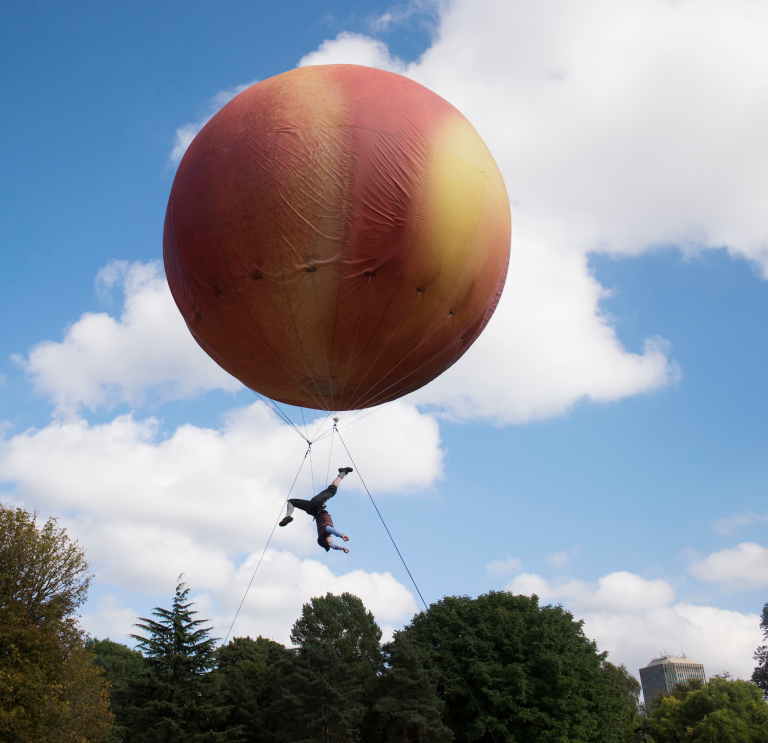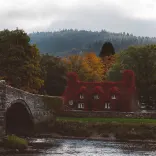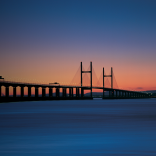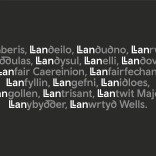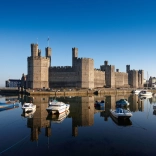It's a tall order to choose a only a few of Wales' great poets, playwrights and authors to highlight. These are just a selection of them, both past and present.
Roald Dahl
Born in Llandaff, Cardiff to Norwegian parents, Roald Dahl (1916-1990) has sold more than 250 million books worldwide. Although he wrote adult fiction and short stories, Dahl’s most enduring works are children’s favourites like Charlie and the Chocolate Factory, James and the Giant Peach, The BFG and Matilda. Dahl was also an accomplished screen writer – he wrote the scripts for Chitty Chitty Bang Bang and the James Bond film You Only Live Twice. The Norwegian Church in Cardiff Bay where the Dahls worshipped is now an arts centre; the nearby public plaza is named Roald Dahl Plas in his honour.
Discover more about Dahl’s Welsh connections.


Dylan Thomas
Dylan Thomas (1914-53) was born and raised in Swansea, and his dazzlingly inventive use of language made him one of the most important poets of the 20th century. His most celebrated works include the ‘play for voices’ Under Milk Wood, and poems like Do Not Go Gentle Into That Good Night and Fern Hill. Thomas made regular tours of the United States, where he was a major influence on the Beat Generation. In Swansea the Dylan Thomas Centre has a permanent exhibition on the poet and hosts an annual festival, while the biennial Dylan Thomas Prize is awarded to a writer aged 39 or under – the age at which Thomas died. He is buried in the churchyard at Laugharne, where he spent his final years.
Discover more about Dylan and Laugharne.

RS Thomas
The poet Ronald Stuart Thomas (1913-2000) was a passionate, and sometimes militant, defender of Welsh language and culture. And yet he wrote dazzlingly in English, publishing more than 1,500 poems in over 20 volumes of a 50-year writing career. Born in Cardiff, Thomas worked as an Anglican priest, moving parishes further north and west in Wales until he could move no further: he settled at Aberdaron on the very tip of the Llŷn peninsula. Unlike his namesake Dylan, RS’s poems employ a language of stark simplicity and great beauty. He received the Queen’s Gold medal for poetry in 1964 and was nominated for the Nobel Prize for Literature in 1996.
Jan Morris
Jan Morris (b.1926) has travelled to every corner of the earth, yet it is ‘the damp, demanding and obsessively interesting country’ of Wales which remains her first love. Morris has been many things: a soldier, a journalist, a travel writer and a historian. In 1953 while working for The Times she secured one of the century’s great scoops - a report of the conquest of Everest. An author of more than 40 books, she has been called the pre-eminent travel writer of our time.
Owen Sheers
Owen Sheers (b. 1974) is a novelist, poet, playwright and TV and radio presenter. Born in Fiji but brought up in Abergavenny, his poems and novels often evoke the rural landscape he grew up in. But it’s the diversity and ambition of his work that makes him stand out: Sheers worked with the actor Michael Sheen to create a three-day passion play which unfolded over the Easter weekend of 2011 in Port Talbot. Sheers’ verse-drama Pink Mist was performed to great critical acclaim at the Bristol Old Vic, while his BAFTA-nominated film-poem, The Green Hollow, dealt with the tragedy of the Aberfan disaster. He is Professor in Creativity at Swansea University.
Gillian Clarke
Born in Cardiff and now living in Ceredigion, Gillian Clarke (b. 1937) became the third National Poet of Wales in 2008. Her work has been translated into ten languages, and she has been awarded the Queen’s Gold Medal for Poetry. She has also written radio and theatre drama, and translated poetry and prose from Welsh. The Gathering/Yr Helfa, commissioned by the National Theatre of Wales, was performed on Yr Wyddfa (Mount Snowdon) in 2014. She regularly tutors poetry masterclasses at Tŷ Newydd, the National Writing Centre of Wales in Llanystwmdwy, North Wales. Her latest work is a version of the 7th-century Welsh poem Y Gododdin – which makes the first-ever reference to King Arthur.

Ifor ap Glyn
Ifor ap Glyn (b.1961) is the current National Poet of Wales. Born in London to Welsh parents, he is a multi-award-winning poet, presenter, director and producer. He has twice won the Crown at the National Eisteddfod – one of the festival’s most prestigious prizes. He lives in Caernarfon and has represented Welsh poetry around the world in both the Welsh and English language, having performed at festivals such as the Smithsonian Folk Life Festival in Washington DC.
Read Ifor ap Glyn's feature explaining how language is at the heart of Welsh daily life.

Dafydd ap Gwilym
One of the greatest medieval European poets, Dafydd ap Gwilym (c14th) was born into a noble family near Aberystwyth. Around 170 of his poems survive, which brim with vibrancy and vigour. Love and sex were regular themes; a few of his works are so joyously filthy that they have only recently been included in collections. He died around 1350; both Strata Florida Abbey in Ceredigion and Talley Abbey in Carmarthenshire claim to be his burial place.

Sarah Waters
Born in Neyland in Pembrokeshire, Sarah Waters (b.1966) won the 1999 Betty Trask Award for her debut novel, Tipping the Velvet, the first of a series of gothic dramas set in Victorian society, often with lesbian protagonists. A further three novels – Fingersmith, The Night Watch and The Little Stranger – were nominated for the Man Booker Prize. Every one of Waters’ six novels has been adapted for film or TV.
Hedd Wyn
The soldier-poet Ellis Evans – better known by his bardic name, Hedd Wyn – is a major figure in Welsh cultural life. At the 1917 National Eisteddford, the archdruid called out the name of the winning bard three times, but nobody stepped forward. Then he solemnly announced that the poet had been killed in battle at Passchendaele six weeks earlier. The chair was draped in a black shroud. The 1917 festival is still known as ‘Eisteddfod y Gadair Ddu’ – the Eisteddfod of the Black Chair. The poet’s family farm, Yr Ysgwrn, near Trawsfynydd, is now a visitor centre with exhibitions about his life and legacy.


Kate Roberts
One of the foremost Welsh language writers of the twentieth century, Roberts (b 1891) was known as ‘Brenhines ein llên’ – ‘the queen of our literature’. Born near Caernarfon, she worked as a teacher in various schools in South Wales. Best known for her short stories, such as Te Yn y Grug (Tea in the Heather) and Ffair Gaeaf a Storiau Eraill (Winter Fair and Other Stories), she also wrote novels, such as Traed Mewn Cyffion (Feet in Chains). Many of Roberts’ works have been translated into other languages.
There are many more Welsh literary greats we could mention…
- Dannie Abse (1923-2014) – Cardiff-born poet, novelist and physician.
- Aneirin (6th century) – his epic Y Gododdin contains the earliest reference to King Arthur.
- Trezza Azzopardi (b1961) – Cardiff-born novelist of Maltese descent, her novel The Hiding Place was Booker-nominated in 2000.
- Alexander Cordell (1914-1997) – Rape of the Fair Country was the first of several novels set during the Industrial Revolution in the South Wales Valleys.
- Andrew Davies (b1936) – a highly original screenwriter, Davies is also the king of TV adaptations: Bridget Jones’s Diary, Pride and Prejudice, Brideshead Revisited and House of Cards are among his hits.
- Russell T Davies (b1963) – TV writer and producer whose work includes Queer as Folk and the revival of Doctor Who.
- WH Davies (1871-1940 – hobo-poet famous for the lines, “What is this life if, full of care, we have no time to stand and stare.”
- Caradoc Evans (1878-1945) – pioneering Anglo-Welsh writer whose scathing criticism of Welsh religion and education are still controversial.
- Ken Follett (b1949) – the thriller-writer has sold 160 million copies worldwide.
- George Herbert (1593- 1633) – Montgomery-born metaphysical poet, priest and theologian.
- Alun Lewis (1915-1944) – the foremost poet of the Second World War, he died in Burma.
- Geoffrey of Monmouth (11th / 12th century) – medieval historian and chronicler.
- Iolo Morganwg (1747-1826) – antiquarian, poet, tall-story-teller, and founder of the modern National Eisteddfod.
- Philip Pullman (b1946) – the author of His Dark Materials trilogy went to school in Ysgol Ardudwy, Harlech. A TV adaptation starring Hamilton creator Lin-Manuel Miranda is being filmed in Wales.
- Beth Reekles (b1995) – teenage publishing sensation whose debut The Kissing Booth was made into a Netflix film.
- Bernice Rubens (1923-2004) – the first woman to win the Man Booker Prize, in 1970.
- Bertrand Russell (1872-1970) – philosopher, logician, mathematician, historian, writer, social critic, political activist, and Nobel laureate.
- Taliesin (6th century) – court poet who served under Celtic-British kings of Powys and the Hen Ogledd (the ‘old north’, now part of northern England and southern Scotland).
- Edward Thomas (1878-1917) – born in London of Welsh stock, the essayist, critic and the poet was killed in action in France.
- Henry Vaughan (1621-1695) – the Breconshire metaphysical poet was admired by Wordsworth, Tennyson and Sassoon.
Have a look over on VisitWales.com to find out more about the places that inspired some of our greatest writers.
